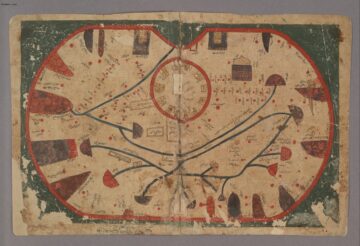A new book in Russian entitled Poetry as a Means of Preaching: The Concept of “the Good Word” in Nasir Khusraw’s poetry was published by Natalis Press, Moscow in September, 2007. This work, by Leila R Dodykhudoeva and Marina L Reisner, was commissioned by the IIS and Hakim Elnazarov, the Institute’s Central Asian Studies Project Coordinator, was one of the book’s co-editors.
Nasir Khusraw, the 10th century Isma‘ili poet and thinker, belongs to a long tradition in Persia and elsewhere of expressing philosophical thought in poetry. His discourse has philosophical and didactic elements, with a strong spiritual and ethical purpose. He expressed his teachings using poetry as a tool to convey values in symbolic form, inviting people to be better human beings.
This particular work explores how Nasir Khusraw’s poetry enriched Persian language’s literary and moral diversity. His conception of “the Good Word” (sukhan-i nek) was based on the principle of cognition of its divine nature: the perfect poet is the one whose works have an inner meaning – the true sense of the Word connected with the creative nature of God. Emphasizing doctrinal and ethical principles, the poet’s idiom and nuances guide the reader towards wisdom, advice, moral guidance – expressions used for conveying the power of “the Good Word”.
Dr Dodykhudoeva is currently a Senior Research Fellow at the Institute of Linguistics at the Russian Academy of Sciences in Moscow. Professor Reisner teaches History of Persian Literature in the Iranian Philology Department at the Institute of Asian and African Studies (IAAS) of Moscow State University. The two Russian scholars of Persian language have previously published works on Nasir Khusraw together. Their work includes The Concept of Sukhan-i Nik in Nasir Khusraw’s Didactic Qasidas, in Nasir Khusraw: Yesterday, Today, Tomorrow (2005). Both also presented papers at a conference entitled The Philosophical Poetry of Nasir Khusraw convened by Alice Hunsberger in 2005.






